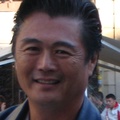It’s the middle of the desert, and I’m surrounded by a lush and verdant rainforest, a jungle unlike any on earth. Palm trees tower above me. At my feet a lagoon meanders through the orchids and bromeliads and birds of paradise. The crash of a waterfall, cascading with furious force. Mist drifts through like a swirling visible breeze, condensing on a rainbow of tropical flowers. Above me spires a hundred foot high Plexiglas dome, the type of pod our forebears might end up living within, given the way we treat this planet like our own play pit to plunder and foul at our whim.
All this, of course, is standard Vegas. As is the volcano outside with its smoke and fire spraying a hundred feet in the air, spilling streams of molten lava. As are the dolphins cavorting in the aquarium or the albino tigers of Siegfried and Roy. Voodoo spells making each visitor think—Anything is possible here, anything can be yours.
My brother Tommy loved this wacky place, almost as much as he did the outer reaches of the universe. Apparently he was never bothered by the casino’s name—The Mirage. All that mattered to him was that this was where the legendary Johnny Chan played most of his non-tournament poker. This is where Chan stalked the whales and high rollers like Larry Flynt or Roger King (unknown to the general public but whose company syndicates Oprah and Wheel of Fortune).
Chan first came here at sixteen, bankrolled from working in his father’s Chinese restaurant back in Houston and from card games behind the restaurant and the pool hall and garage next door. Cocky as a yellow-faced Tom Cruise, Chan got cleaned out at the high stakes black jack tables in a couple days. He kept coming back again and again, busting hard earned bankrolls, even after he switched to his natural métier. Eventually though he got over the hump and then some. The only winner of two straight World Poker titles (narrowly missing his third to that lizard Phil Helmuth), with ten titles total. And there’s that cameo in Rounders where Matt Damon bluffs Chan out and proves to himself he can sit with the big boys.
For those of us who keep track of such things Chan was the first Asian to break into that circle of titans like Chip Reese and Doyle Brunson. He paved the way for a whole horde of Asian players, like Scottie Nguyen and Tu Le and Min the Magnificent, who once complained to the management at the Bellagio when the rice cooker Min brought from home set off the smoke alarm—“Goddamnit, I’ve got to have my rice and I get this sort of shit?” But it wasn’t just the high stakes pro players. Johnny, a.k.a. the Orient Express, laid the tracks down for all the Asians and Asian Americans who now make their ways to the casinos here. The thing you can say about Vegas, its green knows no colors. It’s one place a katonk like me can go and not feel like one of Siegfried and Roy’s albino tigers must feel—that you’ve somehow strayed a long way from home.
Part of me though hates the fact that the Orient Express became such an icon. My brother saw this bulldog of a man make it and make it as an Asian American. That was all he needed to jet his gambling jones into high gear. He never saw the recent poker website where Chan tells prospective pros that they should take a lesson from other successful professionals and lead “balanced lives. Such professionals usually have families, or at the very least, partners and a wide circle of friends. Of course they stay away from drugs and other bad habits, that goes without saying….”
No, all Tommy saw when he looked at Johnny Chan was the man who’s proclaimed himself “the coolest poker player you’ll ever meet.” But I suppose that’s why a place like Vegas exists—to lure the suckers in, one hand at a time, all the while letting them drown in the illusion of cool.
Last night I got the chance to see Chan play, his familiar orange in front of his face as he sniffed its rind and contemplated the flop. The man possessed such chi, it just radiated outward from him, flowing over the table, taking over the other players, fucking with their heads. Even I could see it in their eyes. Some British guy is there with all his Limey buddies and they’re shouting encouragement to him because he’s sitting at the same table with the Orient Express. The Brit raised Chan on the flop and the turn card, looking the champ straight in the eye, jutting out his chin, just daring him on in. And then they got to the river and Chan lowered his orange, not too fast, not too slowly, but methodically, purposefully, like a surgeon sliding in for the cut. He went all in. And the Brit? Well he sat there looking at Chan, probably discovering for the first time in his life just how inscrutable we people can really be. A few seconds passed, and then the Brit just collapsed in front of everyone like a burst balloon, all the air popped out of him. He probably should have called—that’s what he would tell himself later, over and over up in his hotel room, that’s what his buddies would tell him later, rubbing it in—but…he couldn’t. This was Johnny Chan. You can’t stare down history, you can’t forget how the man lured Erik Seidel and his pair of queens right smack into his nut straight in the ’88 World Series, the scene Matt Damon studies over and over in Rounders.
The Brit flipped his cards to the dealer. All his mates groaned.
As for me, I can’t really say I didn’t get a kick out of seeing an Asian American guy clip the Brit’s balls. How often have I gotten to see something like that? Not on television, not in the movies, not in the vast silences of my family’s history. But the moment that thought of triumph jumped up inside me, as if I had been the one who had cleared the table, as if I were the one with the cojones, it quickly left. For I was brought back to a night out with Tommy in San Francisco, several years ago, when he was still in grad school and brilliant with promise. A night when Tommy went after someone just like Chan did and came up a seeming winner. But I know what happened afterwards, I know the end of the story.
I didn’t feel so hot after that. Sometimes making your cojones lets you sweep up the world. Sometimes it just gives the world the chance to sweep you up. I suppose it depends on whether you’ve got a World Series bracelet on your wrist or not.
What Tommy forgot is that coming from a family like ours, you can’t go for broke.
I’m sitting at the piano bar at the Mirage, downing another Bacardi and Coke. Not really, I rationalize, a serious drinker’s drink. I glance around at the salesmen and retirees, the table of yuppie brokers or lawyers, the housewives from Duluth or Pittsburgh, and everyone seems to be having a hell of a time. Even the working girl over there seems like she’s on a lark, chatting up some guy who looks Ernest Borgnine—not the ridiculous Ernest Borgnine of McHale’s Navy but the more poignant working class sad sack of Marty. Vegas is kind of timeless in that way. The old classics die slowly here, they never really go away.
On the other hand people do drown here. Chip by chip, drink by drink, fuck by fuck, broken heart by broken heart, Vegas dissolving their souls away when they come back too often or stay too long.
I look around and suddenly it hits me. Isn’t an official suicide a technicality, merely a matter of time and degrees. Say day after day you’re slipping nicotine jolts of carcinogens into your lungs, pack after pack no matter how many Surgeon General reports come out. Isn’t that a voluntary inching toward the end? Or is it only suicide when you reach the stage of emphysema? Or are the doses so small they don’t really count, unlike those scuttlings through O.D.s, like with Janis Joplin or Johnny Rotten? But of course even there we’re left with a trace of ameliorating doubt. Perhaps it was an accident, a miscalculation, perhaps they never really meant it, or meant it and then wanted to take it back, that last bit of scag in the needle, those final few drops that drew them into the warm and waiting arms of oblivion.
Do we take Socrates for one of the tribe, who quaffed his hemlock, though under duress of the State? It makes a difference, doesn’t it, if it’s you who sips the poisonous brew, and not some peon of the penitentiary system who presses a button and releases the cocktail of permanent paralysis into your strapped down carcass? So when does No-No turn into Yes-Yes? When does spitting in the face of the emperor become not simply defiance but death wish?
There’s that famous series of photographs, which I’ve studied. In the center is a naked Chinese man with gaping chest wounds. He’s fastened to a post. Around him stand various Chinese in coats and conical hats. The witnesses look down to where one of the men scrapes something—it appears to be blood—off the victim’s legs. Carpeaux, who published the photo, claims to have witnessed this torture in 1905. The man, Fou-Tchou-Li, was found guilty of murdering the Prince Ao-Han-Ouan. Was he a revolutionary? The book doesn’t say. All it says is that he was first sentenced to be burned alive, but this was deemed too cruel a torture and so they condemned the man to slow death by countless cuts. The method dates from the Manchu dynasty, and at the time was over two hundred years old. They administered opium to the condemned man, though not in the name of mercy. The dope prolonged the torture, allowed the victim to remain conscious longer. Perhaps it also explains the expression of ecstasy in the victim’s gaze, which is directed upward, above the crowd. In one of the photos, he even seems to smile. In another a guard saws through Li’s limb. By the final photo the victim was reduced to a thorax, dangling there like an insect plucked by a wanton boy.
A thousand small cuts. But that’s Chinese, not Japanese. Which is not to stay those of the rising sun didn’t have their own methods of cutting you down to size.
Of course I’m a Japanese American. An entirely different case.
***
“The Orient Express” was first published in The Asian American Literary Review, Issue 1. AALR is a not-for-profit literary arts journal, a showcase of the best of today’s Asian American literature. To learn more about the journal or purchase a subscription, visit them online at www.asianamericanliteraryreview.org, or find them on Facebook.
© 2010 David Mura





